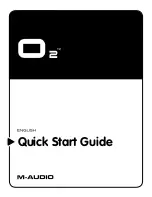
Effects
Ring Modulation
9-23
Pitch
.
The
fundamental
pitch
imposed
upon
the
input,
in
MIDI
note
numbers
from
C
‐
1
to
G9.
Ptch
Offst
is
an
offset
from
the
pitch
frequency
in
semitones,
from
‐
12.0
to
12.0.
It
can
be
useful
to
assign
pitch
bend,
a
ribbon,
or
another
continuous
controller
to
this
parameter
through
a
MOD.
Odd
Wts
,
Pair
Wts
,
Quartr
Wts
,
Half
Wts
are
parameters
that
control
the
shape
of
the
frequency
response
of
Pitcher.
An
exact
description
of
what
each
one
does
is,
unfortunately,
impossible,
since
there
is
a
great
deal
of
interaction
between
them.
For
more
information
and
examples,
see
the
KSP8
Algorithm
Reference
Guide
.
Ring Modulation
Ring
modulation
multiplies
two
signals
(the
“carrier”
and
the
“modulator”)
together
to
produce
unusual,
often
non
‐
harmonic,
overtones.
The
Ring
Modulator
algorithm
in
the
PC3K
has
two
modes:
“
L*R
”
in
which
two
mono
signals
are
modulated
together;
and
“
Osc
”,
in
which
the
input
is
stereo,
and
it
is
modulated
with
the
sum
of
five
waveforms
that
are
generated
from
oscillators
within
the
algorithm
itself.
Four
of
these
oscillators
are
sine
waves,
while
one
(Oscillator
1)
offers
a
selection
of
waveforms.
Wet/Dry.
When
the
algorithm
is
in
“L*R”
mode,
this
controls
how
much
of
the
left
signal
only
is
passed
dry
(the
right
signal
isn’t
passed
dry
at
all).
Mod
Mode
selects
between
the
two
modes.
Osc1
Lvl
is
the
level
of
Oscillator
1,
from
0
to
100%.
Osc1
Freq
is
the
frequency
of
Oscillator
1,
from
16
to
25088
Hz.
Osc1
Shape
is
the
waveshape
of
Oscillator
1,
selectable
from
Sine,
Saw+,
Saw
‐
,
Pulse,
and
Tri.
Osc1PlsWid
(Pulse
Width).
When
Osc1
Shape
is
set
to
Pulse,
this
sets
the
pulse
width
as
a
percentage
of
the
waveform
period.
When
the
width
is
set
to
50%,
the
result
is
a
square
wave.
This
parameter
has
no
effect
if
other
waveform
types
are
chosen.
Range
is
0
to
100%.
Osc1Smooth
smooths
(removes
the
higher
harmonics
from)
the
Saw+,
Saw
‐
,
and
Pulse
waveforms.
A
Sawtooth
wave
becomes
more
like
a
triangle
wave,
and
a
Pulse
wave
becomes
more
like
a
sine
wave.
Range
is
0
to
100%.
The
other
four
oscillators,
Sine2
through
Sine5
,
each
have
Lvl
and
Freq
controls.
Stereo Simulation
The
Mono
to
Stereo
algorithm
converts
a
monaural
input
to
simulated
stereo
output.
In
Select
selects
the
input
signal
to
be
“stereo
‐
ized”.
It
can
be
Left,
Right,
or
both:
(L+R)/2.
CenterGain
is
the
level
of
the
summed
left
and
right
channels.
Range
is
Off/
‐
79.0
to
24.0
dB.
Diff
Gain
is
the
level
of
the
difference
signal
produced,
which
is
the
spatial
component
of
the
stereo
signal.
Range
is
Off/
‐
79.0
to
24.0
dB.
DiffBassG
controls
the
gain
of
a
bass
‐
shelf
filter
on
the
difference
signal.
By
boosting
the
low
frequency
components
of
the
difference
signal,
you
can
increase
the
sense
of
acoustic
envelopment.
Range
is
‐
79.0
to
24.0
dB.
DiffBassF
is
the
transition
frequency
for
the
bass
‐
shelf
frequency.
Range
is
16
to
25088
Hz.
Summary of Contents for PC3K6
Page 24: ...1 6 Introduction Options...
Page 50: ...4 4 The Operating Modes Using the Modes...
Page 58: ...5 8 Editing Conventions Special Button Functions...
Page 130: ...6 72 Program Mode Programming Tips...
Page 202: ...7 72 Setup Mode Recording A Setup To Song Mode...
Page 206: ...8 4 Quick Access Mode The QA Editor...
Page 232: ...9 26 Effects Mono Algorithms...
Page 268: ...11 18 Master Mode Preview Sample PRVIEW...
Page 302: ...12 34 Song Mode and the Song Editor Song Editor The EVENT Page...
Page 328: ...14 14 Keymap and Sample Editing Editing Samples...
Page 334: ...B 4...
Page 370: ...D 32 PC3K Objects V 1 31 Effect Chains...
Page 372: ...E 2 PC3K Legacy File Conversion Object Types and Conversion Details...
















































